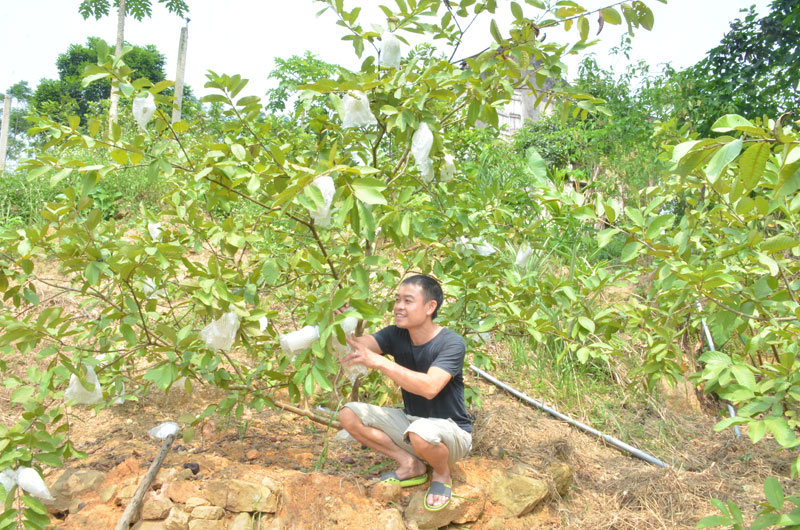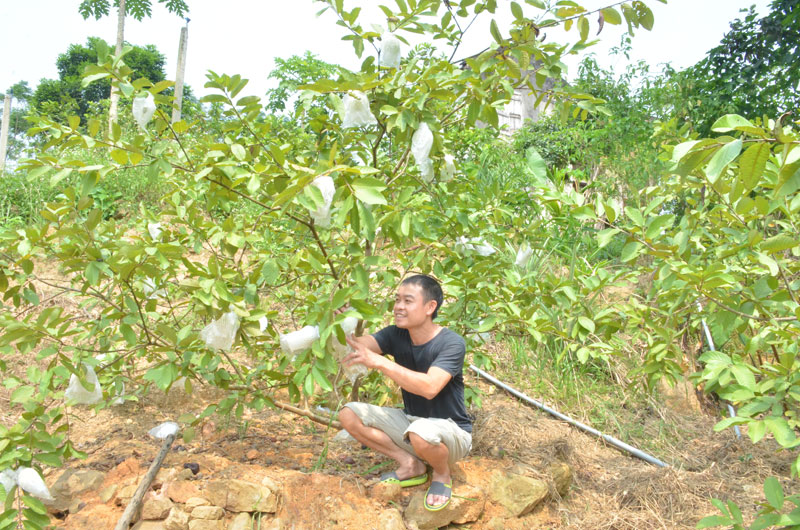
(HBO) – The northern province of Hoa Binh has advantages in agricultural production with various typical farm produce, which will make important contributions to rural economic development. At present, the One Commune, One Product (OCOP) programme is being carried out in the province, empowering agriculture, rural areas, and farmers.

Yen Mong commune, Hoa Binh city, is building brand for
its guava.
To implement effectively the OCOP programme, the
provincial People’s Committee has directed the provincial Department of
Agriculture and Rural Development to coordinate with the coordination office for
building new rural areas to develop a project implementing the programme in
2018-2020, with orientations to 2030.
The province aims to standardise at least 25
percent of agricultural products (about 50 products) and carry out the
programme in 10-15 villages. It also focuses on diversifying and processing
products according to value chains, and completing production organisation in
the direction of connecting production households with cooperatives and
enterprises.
The locality will reinforce about 50 economic
organisations and develop at least 10 others to join the OCOP programme. It
will also implement trade promotion and build a system of centers and stores
introducing OCOP products in areas with favourbale trade and tourism
conditions.
The province has examined all products to select
one-two key products in each district and one key product in each
commune.
According to Deputy Director of the provincial
Department of Agriculture and Rural Development Nguyen Anh Quan, key products
could be existing or new ones, but competitive and commercial, bringing in high
economic efficiency. With proper investment, local products with competitive
edges could be developed more formally.
The OCOP programme focuses on developing forms
of community-oriented production with the voluntary participation of economic
organisations and people to tap the potential and advantages of the agriculture
and service sectors to create high-quality and competitive products,
contributing to the modernisation of agriculture and industrialisation of rural
areas.
According to data from the Hoa Binh Provincial Party Committee, the industrial production index for the first six months of 2025 is estimated to have increased by 20% compared to the same period last year. This marks the highest year-on-year growth rate for this period since 2020.
In the first six months of 2025, Hoa Binh province’s export turnover was estimated at 1.145 billion USD, marking an 18.11% increase compared to the same period in 2024. Import turnover was estimated at $ 804 million, a 17.15% increase, which helped the province maintain a positive trade balance.
The lives of the ethnic minority farmers in Tan Lac district have gradually improved thanks to the new directions in agricultural production. This is a testament to the collective strength fostered through the professional associations and groups implemented by various levels of the district’s Farmers’ Union.
With the motto the "product quality comes first,” after nearly one year of establishment and operation, Muong village’s Clean Food Agricultural and Commercial Cooperative, located in Cau Hamlet, Hung Son Commune (Kim Boi district), has launched reputable, high-quality agricultural products to the market that are well-received by consumers. The products such as Muong village’s pork sausage, salt-cured chicken, and salt-cured pork hocks have gradually carved out a place in the market and they are on the path to obtaining the OCOP certification.
In the past, the phrase "bumper harvest, rock-bottom prices" was a familiar refrain for Vietnamese farmers engaged in fragmented, small-scale agriculture. But today, a new spirit is emerging across rural areas of Hoa Binh province - one of collaboration, organisation, and collective economic models that provide a stable foundation for production.
Maintaining growing area codes and packing facility codes in accordance with regulations is a mandatory requirement for agricultural products to be eligible for export. Recently, the Department of Agriculture and Environment of Hoa Binh province has intensified technical supervision of designated farming areas and packing facilities to safeguard the "green passport" that enables its products to access international markets.



